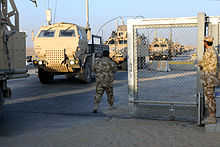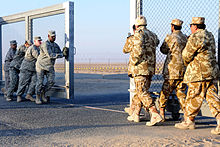Remaining US troops exit Iraq
Wednesday, December 21, 2011

Image: Cpl. Jordan Johnson, US Army.
The last convoy of US soldiers crossed the border from Iraq into Kuwait on Sunday, effectively bringing the controversial eight-year long Iraq War to an end. The final convoy, containing around a hundred US military vehicles with five hundred troops, exited Iraq at 0738 AST (0438 UTC) Sunday.
Private First Class Martin Lamb described the departure as "a good feeling ... knowing this is going to be the last mission out of here". The event was "[p]art of history, you know — we're the last ones out," according to Lamb.
The Iraq War, which commenced in 2003 on the pretext of Iraq possessing weapons of mass destruction, which later turned out to be false, was responsible for toppling the regime of Iraqi dictator Saddam Hussein and introducing a democratic government within Iraq. In the aftermath of Hussein's downfall, a violent, religion-based conflict broke out between those of Shia Islam faith and Sunni Islam communities, reaching its peak in 2006. The following year, a large number of US troops were sent into Iraq; the number of sectarian and insurgent attacks subsequently declined.
The Iraq War involved a maximum of over 170,000 US troops, stationed in Iraq at more than 500 bases. Tens of thousands to over 100,000 Iraqi citizens and close to 4,500 US troops were killed as a result of the war. The financial cost of the Iraq War was almost US$1 trillion (€767 billion or £638 billion) to the US government.
US presence in Iraq has been reduced to 157 soldiers in charge of military training at their embassy in the capital Baghdad and a minor base of US marines. The US federal government reportedly intended to retain a minor counter-terrorism presence in Iraq, as well as the continuation of military training in the country. However, negotiations between US government representatives and Iraqi officials were unsuccessful, as they failed to reach an agreement on legal matters, such as troop immunity.
In 2008, the Bush administration had committed to withdrawing all US troops from Iraq by the end of 2011, a movement which was announced by his successor and current US president Barack Obama in October 2011. Obama signified the conclusion of the war with Nouri al-Maliki, the prime minister of Iraq, earlier this month. In a speech in North Carolina at Fort Bragg, Obama stated that the country US troops were leaving is now "sovereign, stable and self-reliant".

Image: Cpl. Jordan Johnson, US Army.
Reaction to the US government's decision has been mixed. According to Voice of America opinion polls in the United States indicate that a majority of Americans believe the war lasted longer than it should have done. Obama himself had opposed the war when he ran for president and vowed to end it. News agencies report Iraqis glad to see the US leave, but concerned for the future.
Arab News reports that Iraqis also have mixed feelings, such as Safa, a 26-year old baker using a pseudonym, who said "I am proud — all Iraqis should be proud, like all those whose country has been freed. The Americans toppled Saddam, but our lives since then have gone backward." He also said, "The situation will only improve if politicians work on fighting corruption and adopt reforms."
A 50-year-old mother calling herself Umm Mohammed said, "I don't think we can ever forgive the Americans for what they did to us, from killings to terrorism. Those people [Americans] think only about themselves, and not about the consequences of their actions."
Mohammed Abdelamir, 60, said "We must all cooperate and work to improve the economy, the society, and begin rebuilding, and not fight because we are seeing that some politicians have already begun putting a stick in the wheel."
Other Iraqis who worked for Americans are fearful over their departure, fearing they may be killed. John, a pseudonym for one such Iraqi, said to Al-Jazeera, "It’s a fact to these people, we betrayed our country, anyone who worked with the Americans. They think we don’t even deserve to be Iraqi."
Mark, another such Iraqi, said "All the people around me know that I was working with the Americans. We feel that we are in danger from anyone who was against the US troops." John and Mark both worked for Provincial Reconstruction Teams (PRT) in Iraq. Both men have applied for Special Immigrant Visas (SIV) which the US government created in 2008 for Iraqis who have worked for US forces.
However, there is an immense backlog for applicants, as over 30,000 await a decision. So far, only 7,000 SIV visas have been issued. John has been waiting for a visa for over a year, Mark has been waiting nine months since applying in March. Mark said, "They said we should wait at least six months, but this is crazy". And, "For nine months I am jobless, waiting for that visa. I have nothing to do."
Sources
- "Iraqis celebrate US exit, but worry for future" — Arab News, December 18, 2011
- "Last US troops withdraw from Iraq" — BBC News Online, December 18, 2011
- Gregg Carlstrom. "Iraqis who aided US left behind and fearful" — Al Jazeera, December 18, 2011
- "US Troops Leave Iraq, Ending Almost 9 Years of War" — Voice of America, December 18, 2011
- Thom Shanker, Michael S. Schmidt and Robert F. Worth. "In Baghdad, Panetta Leads Uneasy Moment of Closure" — New York Times, December 15, 2011
Sister links
 Withdrawal of U.S. troops from Iraq on Wikipedia.
Withdrawal of U.S. troops from Iraq on Wikipedia.


